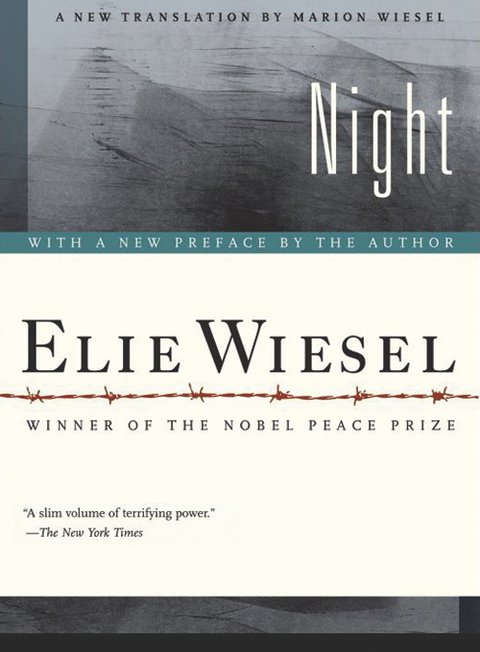"Auschwitz."
Nobody had ever heard that name.
(...)
Never shall I forget that night, the first night in camp, that turned my life into one long night seven times sealed.
Never shall I forget that smoke.
Never shall I forget the small faces of the children whose bodies I saw transformed into smoke under a silent sky.
Never shall I forget those flames that consumed my faith for ever.
Never shall I forget the nocturnal silence that deprived me for all eternity of the desire to live.
Never shall I forget those moments that murdered my God and my soul and turned my dreams to ashes.
Never shall I forget those things, even were I condemned to live as long as God Himself.
Never.
(...)
They came back shattered. They had difficulty opening their mouths. All they could utter was one word: "Evacuation." The camp was going to be emptied and we would be sent to the rear. Where to? Somewhere in the deepest Germany. To other camps; there was no shortage of them.
(...)
At six o'clock the bell rang. The death knell. The funeral. The procession was beginning its march.
(...)
Beneath our feet there lay men, crushed, trampled underfoot, dying. Nobody paid attention to them.
We were outside. The icy wind whipped my face. I was constantly biting my lips so that they wouldn’t freeze. All around me, what appeared to be a dance of death. My head was reeling. I was walking through a cemetery. Among the stiffened corpses, there were logs of wood. Not a sound of distress, not a plaintive cry, nothing but mass agony and silence. Nobody asked anyone for help. One died because one had to. No point in making trouble.
I saw myself in every stiffened corpse. Soon I wouldn’t even be seeing them anymore; I would be one of them. A matter of hours.
(...)
The night was growing longer, neverending.
(...)
The last day had been the most lethal. We had been a hundred or so in this wagon. Twelve of us left it. Among them, my father and myself.
We had arrived in Buchenwald.
(...)
All around me, there was silence now, broken only by moaning. In front of the block, the SS were giving orders. An officer passed between the bunks. My father was pleading:
"My son, water … I’m burning up … My insides …"
"Silence over there !" barked the officer.
"Eliezer," continued my father, "water ..."
The officer came closer and shouted to him to be silent. But my father did not hear. He continued to call me. The officer wielded his club and dealt him a violent blow to the head.
I didn’t move. I was afraid, my body was afraid of another blow, this time to my head.
My father groaned once more. I heard:
"Eliezer ..."
I could see that he was still breathing—in gasps. I didn’t move.
When I came down from my bunk after roll call, I could see his lips trembling; he was murmuring something. I remained more than an hour leaning over him, looking at him, etching his bloody, broken face into my mind.
Then I had to go to sleep. I climbed into my bunk, above my father, who was still alive. The date was January 28, 1945.
I woke up at dawn on January 29. On my father’s cot there lay another sick person. They must have taken him to the crematorium. Perhaps he was still breathing...
No prayers were said over his tomb. No candle lit in his memory. His last word had been my name. He had called out to me and I had not answered.
I did not weep, and it pained me that I could not weep. But I was out of tears. And deep inside me, if I could have searched the recesses of my feeble conscience, I might have found something like: Free at last !...
(...)
Three days after the liberation of Buchenwald, I became very ill: some form of poisoning. I was transferred to a hospital and spent two weeks between life and death.
One day when I was able to get up, I decided to look at myself in the mirror on the opposite wall. I had not seen myself since the ghetto.
From the depths of the mirror, a corpse was contemplating me.
The look in his eyes as he gazed at me has never left me.»
Elie Wiesel

Sem comentários:
Enviar um comentário
Are You talkin' to Me ?